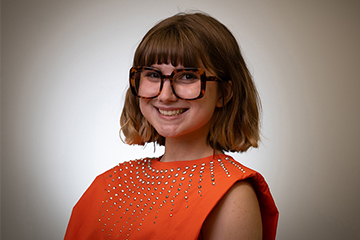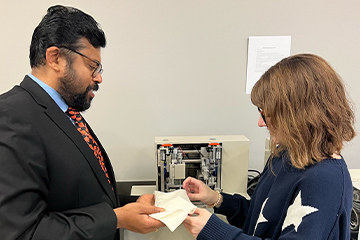
Wentz Research Grant awarded to design and merchandising sophomore
Tuesday, April 22, 2025
Media Contact: Kirsi McDowell | Communications Coordinator | 405-744-8320 | kirsi@okstate.edu
 Jordy Secrest, an apparel design and technology program sophomore from Stillwater, was awarded the Wentz Research grant on April 11.
Jordy Secrest, an apparel design and technology program sophomore from Stillwater, was awarded the Wentz Research grant on April 11.
Supported by the Lew Wentz Foundation and Oklahoma State University, the Wentz Research program awards undergraduate students a $6,000 scholarship to conduct research in their field of study under the supervision of a faculty mentor. Secrest’s proposed project will assess bacterial growth on veterinary scrubs.
In addition to being selected as a Wentz Scholar, Secrest also serves as a College of Education and Human Sciences student ambassador peer mentor.
Inspired by her personal experience with a stepmother who is a veterinarian, Secrest has maintained a curiosity about the kinds and quantities of bacteria the scrubs carry on them within and beyond the clinical setting. Now, she will have the opportunity to explore the most effective way to sanitize scrubs, to protect not only vet staff and animals, but individuals with whom they come into contact.
The primary objective of Secrest’s study is to assess the growth of pathogens on veterinary scrubs and how washing methods affect the rate of bacteria formation when using a home laundering machine.
Practicing veterinarians will be asked to wear new unwashed medical scrubs for two full workdays while performing daily tasks with patients before turning them over to Secrest. Secrest will then begin her experimentation under the supervision of professor and faculty mentor Dr. Sumit Mandal.
Mandal — associate professor of textile science and principal investigator for the Department of Design and Merchandising’s Textiles and Apparel Science Laboratory at OSU — will assist Secrest in operating the lab’s bioburden instrument to determine the biological contamination on veterinary scrubs, implementing various washing techniques, and ultimately determining the biological contaminants that remain present on the scrubs after laundering in disinfectant detergents.
 Secrest will have full access to the lab’s state-of-the-art technology, which was
acquired to study human protection through textiles from different thermal and biological
hazards.
Secrest will have full access to the lab’s state-of-the-art technology, which was
acquired to study human protection through textiles from different thermal and biological
hazards.
Mandal and Secrest have collaborated since the fall of 2024, when she was a student in his textile science course and participated in a textile field study opportunity in North Carolina.
“I always found Jordy to have an inquisitive mind and to be very focused while working on a project,” said Mandal.
“She is a hardworking student, and I appreciate the passion she displays for textile science research. I feel very pleased that she was selected and look forward to serving as her mentor.”
Surprised and grateful to receive the grant, Secrest notes the impact the scholars program will have on her academic and professional career and the lives of those in other fields, saying the award feels like a dream come true.
“This grant will support my research by easing financial pressures, allowing me to focus fully on conducting meaningful work,” said Secrest. “As someone planning to attend graduate school, this opportunity will also provide valuable experience that will help me prepare for the next step in my academic journey.”
Secrest hopes that by publishing her research findings, she will help establish improved sanitation standards in veterinary medicine.
